新概念英语二册 Lesson 34 Quick work 课件 (共34张PPT)
文档属性
| 名称 | 新概念英语二册 Lesson 34 Quick work 课件 (共34张PPT) |  | |
| 格式 | pptx | ||
| 文件大小 | 2.6MB | ||
| 资源类型 | 教案 | ||
| 版本资源 | 新概念英语 | ||
| 科目 | 英语 | ||
| 更新时间 | 2024-02-19 19:02:53 | ||
图片预览




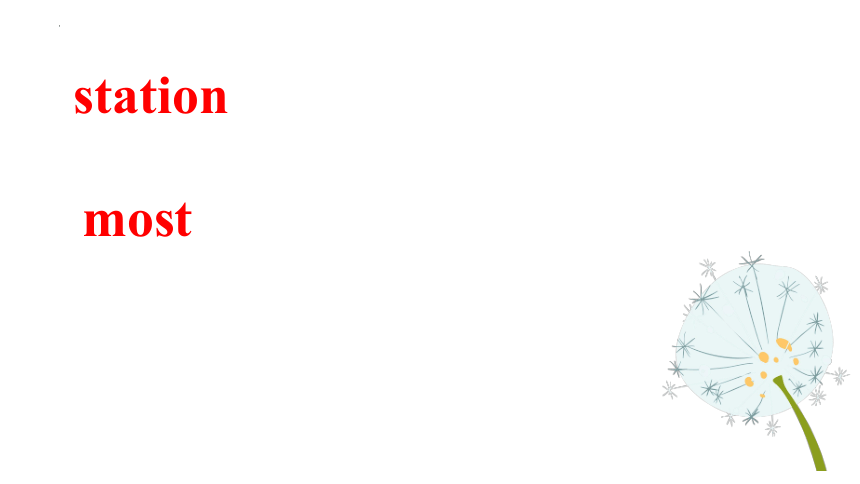

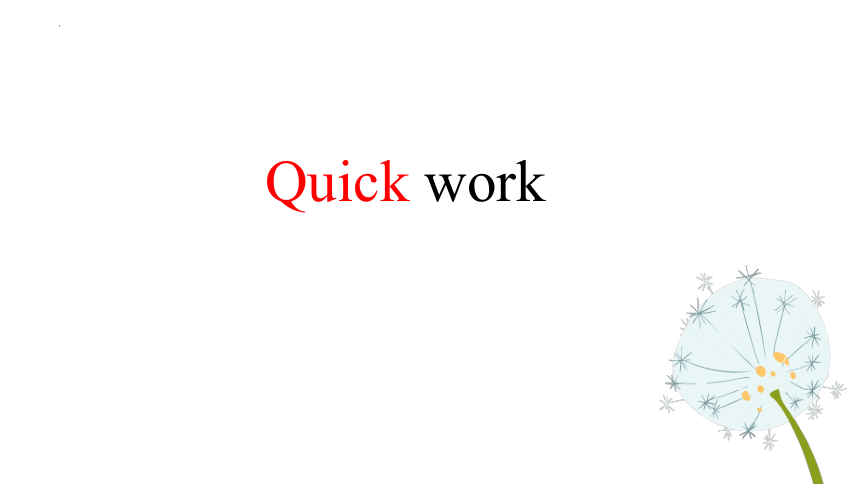
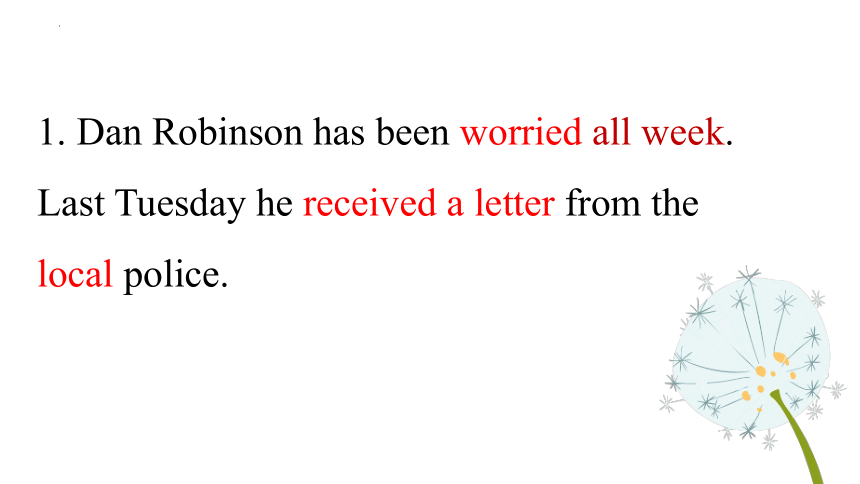
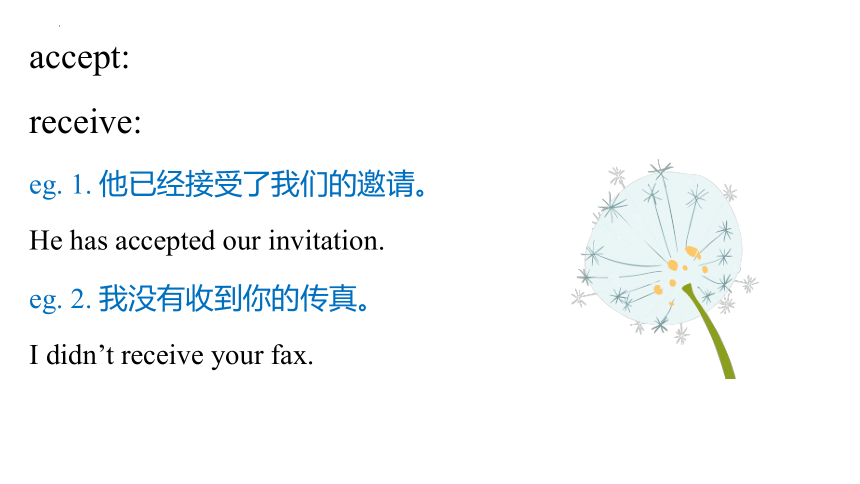
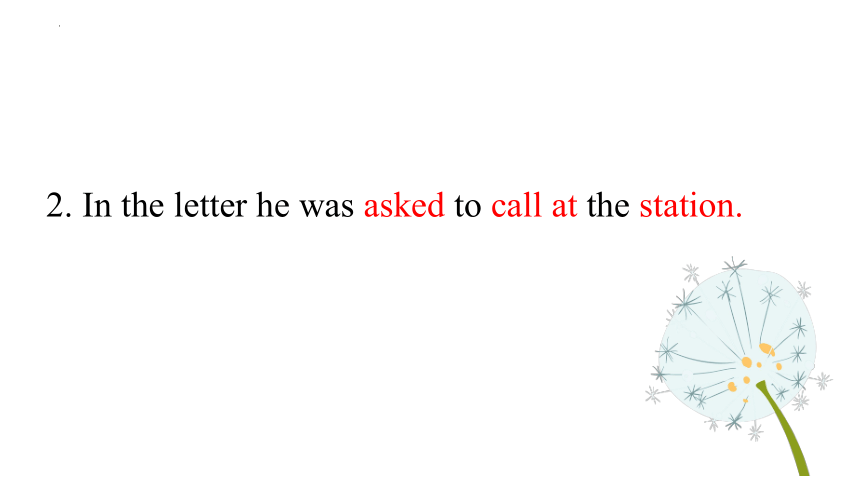
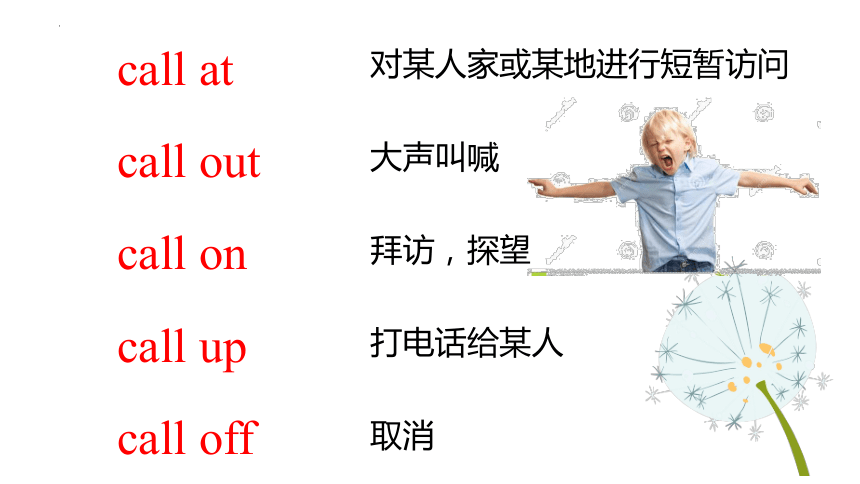
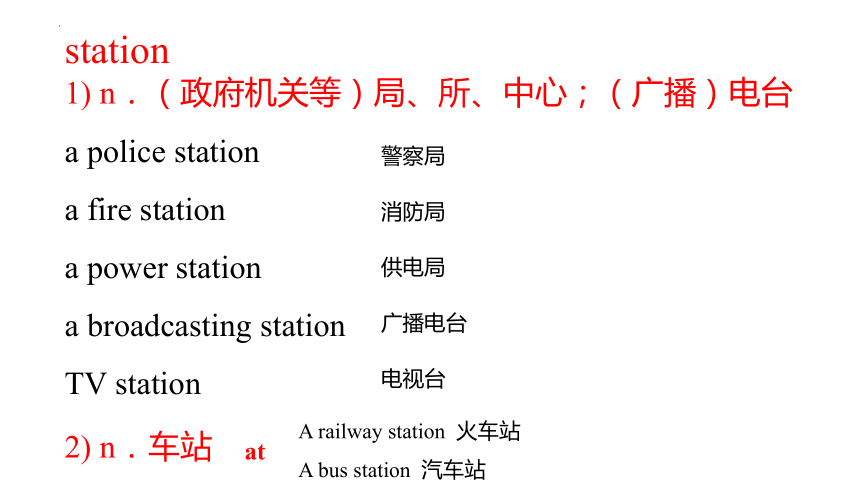
文档简介
(共34张PPT)
34
Quick Work
Daily
Proverb
First come, first served.
先来后到。
01
New Words
02
Text
03
New Words
01
New Words
most
station
02
TEXT
Quick work
1. Dan Robinson has been worried all week.
Last Tuesday he received a letter from the local police.
accept:
receive:
eg. 1. 他已经接受了我们的邀请。
He has accepted our invitation.
eg. 2. 我没有收到你的传真。
I didn’t receive your fax.
2. In the letter he was asked to call at the station.
call at
call out
call on
call up
call off
对某人家或某地进行短暂访问
大声叫喊
拜访,探望
打电话给某人
取消
station
1) n.(政府机关等)局、所、中心;(广播)电台
a police station
a fire station
a power station
a broadcasting station
TV station
2) n.车站
A railway station 火车站
A bus station 汽车站
at
警察局
消防局
供电局
广播电台
电视台
3. Dan wondered why he was wanted by the police, but he went to the station yesterday and now he is not worried anymore.
4. At the station, he was told by a smiling policeman that his bicycle had been found.
5. Five days ago, the policeman told him, the bicycle was picked up in a small village four hundred miles away.
6. It is now being sent to his home by train.
Dan was most surprised when he heard the news.
most
1.adv.相当,非常(加强语气;修饰adj.前可加不定冠词)
eg. 这是一本非常有用的书。
This is a most useful book.
eg. 他对我非常礼貌。
He was most polite to me.
2) most绝大多数的(前面不加冠词)
most of the boys = most boys
4)构成adj./adv.的最高级)最,最多
eg. 这是这个火的最有趣的照片。
This is the most interesting picture of the fire.
7. He was amused too, because he never expected the bicycle to be found.
8. It was stolen twenty years ago when Dan was a boy of fifteen!
03
Grammar
call…
(1)call at表示"对(某个人家或地方)进行短暂访问":
eg. 1. He calls at every house in the street once a month.
他每月对这条街上的每户人家光顾一次。
eg. 2. He was asked to call at the police station.
他被告知去警察局一趟。
(2)call on 表示"拜访"、"探望":
eg.1. Have you called on George recently
你最近去看过乔治吗?
(3)call out表示"大声叫喊":
eg. 1. Some people on the bank called out to the man in the boat.
岸上的一些人对着小船上的那人高喊。
(4)call up在美国英语中表示"打电话(给某人)":
eg. 1. Jane called me up the other day.
前几天,简给我打过电话。
eg. 2. If you want my help, just call up.
你如果需要我的帮助,来个电话就行。
(5)call off 可以表示"取消(某项活动)":
eg. 1. For some reason, they have called off the party / the meeting.
由于某种原因,他们把晚会/会议取消了。
2. It began to rain so we called off the match.
3. The couple decided to call off their reservation.
I called ____ you five times yesterday. Were you out
It’s too late go to dinner. Why don’t we call the whole thing ___
We called ____ to him but he could not hear us.
I called ____ the post office on my way to work.
“Help!” the injured called ____to the rescue team.
on
off
out
at
out
Pick up……
拿起,拾起:
I picked up the receiver as soon as the phone rang.
电话铃一响,我就拿起了话筒。
2) 用车接人:
I’ll pick you up at your office.
我来办公室接你。
3) (不经意) 学到:
She picked up French in Paris.
她是在巴黎学会法语的。
4)(无意地,顺便地)获得,找到:
Where did you pick up that book
你在哪儿买到那本书的?
I've picked up a bad cold.
我得了重感冒。
5). 使好转,改进,增进……
Sue was able to pick up her health under the help of the doctor.
The train is slowly picking up speed.
被动语态复习
Doudou is beaten by me every day.
Doudou was beaten by me yesterday.
Doudou will be beaten by me tomorrow.
*
被动语态 —— 三大时态
be done
一般现在时:
一般过去时:
一般将来时:
be
done
be
done
be
done
am/is/are
was/were
will be
be going to be
done
be
T
h
a
n
k
s!
34
Quick Work
Daily
Proverb
First come, first served.
先来后到。
01
New Words
02
Text
03
New Words
01
New Words
most
station
02
TEXT
Quick work
1. Dan Robinson has been worried all week.
Last Tuesday he received a letter from the local police.
accept:
receive:
eg. 1. 他已经接受了我们的邀请。
He has accepted our invitation.
eg. 2. 我没有收到你的传真。
I didn’t receive your fax.
2. In the letter he was asked to call at the station.
call at
call out
call on
call up
call off
对某人家或某地进行短暂访问
大声叫喊
拜访,探望
打电话给某人
取消
station
1) n.(政府机关等)局、所、中心;(广播)电台
a police station
a fire station
a power station
a broadcasting station
TV station
2) n.车站
A railway station 火车站
A bus station 汽车站
at
警察局
消防局
供电局
广播电台
电视台
3. Dan wondered why he was wanted by the police, but he went to the station yesterday and now he is not worried anymore.
4. At the station, he was told by a smiling policeman that his bicycle had been found.
5. Five days ago, the policeman told him, the bicycle was picked up in a small village four hundred miles away.
6. It is now being sent to his home by train.
Dan was most surprised when he heard the news.
most
1.adv.相当,非常(加强语气;修饰adj.前可加不定冠词)
eg. 这是一本非常有用的书。
This is a most useful book.
eg. 他对我非常礼貌。
He was most polite to me.
2) most绝大多数的(前面不加冠词)
most of the boys = most boys
4)构成adj./adv.的最高级)最,最多
eg. 这是这个火的最有趣的照片。
This is the most interesting picture of the fire.
7. He was amused too, because he never expected the bicycle to be found.
8. It was stolen twenty years ago when Dan was a boy of fifteen!
03
Grammar
call…
(1)call at表示"对(某个人家或地方)进行短暂访问":
eg. 1. He calls at every house in the street once a month.
他每月对这条街上的每户人家光顾一次。
eg. 2. He was asked to call at the police station.
他被告知去警察局一趟。
(2)call on 表示"拜访"、"探望":
eg.1. Have you called on George recently
你最近去看过乔治吗?
(3)call out表示"大声叫喊":
eg. 1. Some people on the bank called out to the man in the boat.
岸上的一些人对着小船上的那人高喊。
(4)call up在美国英语中表示"打电话(给某人)":
eg. 1. Jane called me up the other day.
前几天,简给我打过电话。
eg. 2. If you want my help, just call up.
你如果需要我的帮助,来个电话就行。
(5)call off 可以表示"取消(某项活动)":
eg. 1. For some reason, they have called off the party / the meeting.
由于某种原因,他们把晚会/会议取消了。
2. It began to rain so we called off the match.
3. The couple decided to call off their reservation.
I called ____ you five times yesterday. Were you out
It’s too late go to dinner. Why don’t we call the whole thing ___
We called ____ to him but he could not hear us.
I called ____ the post office on my way to work.
“Help!” the injured called ____to the rescue team.
on
off
out
at
out
Pick up……
拿起,拾起:
I picked up the receiver as soon as the phone rang.
电话铃一响,我就拿起了话筒。
2) 用车接人:
I’ll pick you up at your office.
我来办公室接你。
3) (不经意) 学到:
She picked up French in Paris.
她是在巴黎学会法语的。
4)(无意地,顺便地)获得,找到:
Where did you pick up that book
你在哪儿买到那本书的?
I've picked up a bad cold.
我得了重感冒。
5). 使好转,改进,增进……
Sue was able to pick up her health under the help of the doctor.
The train is slowly picking up speed.
被动语态复习
Doudou is beaten by me every day.
Doudou was beaten by me yesterday.
Doudou will be beaten by me tomorrow.
*
被动语态 —— 三大时态
be done
一般现在时:
一般过去时:
一般将来时:
be
done
be
done
be
done
am/is/are
was/were
will be
be going to be
done
be
T
h
a
n
k
s!
同课章节目录
